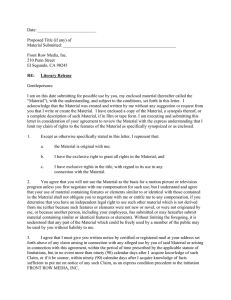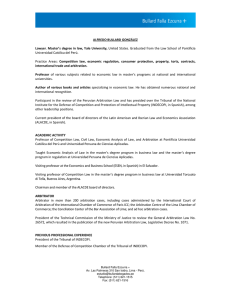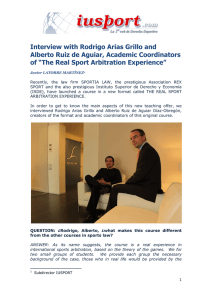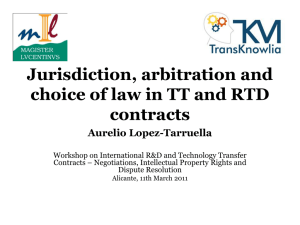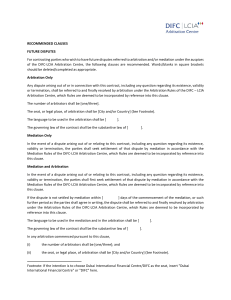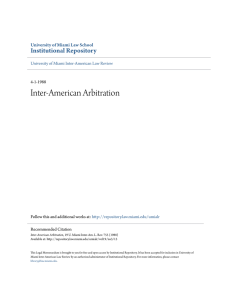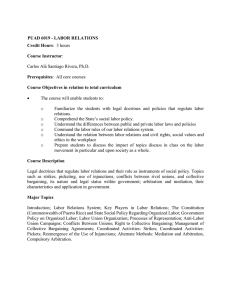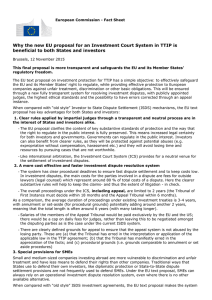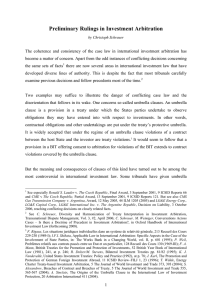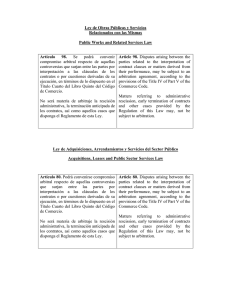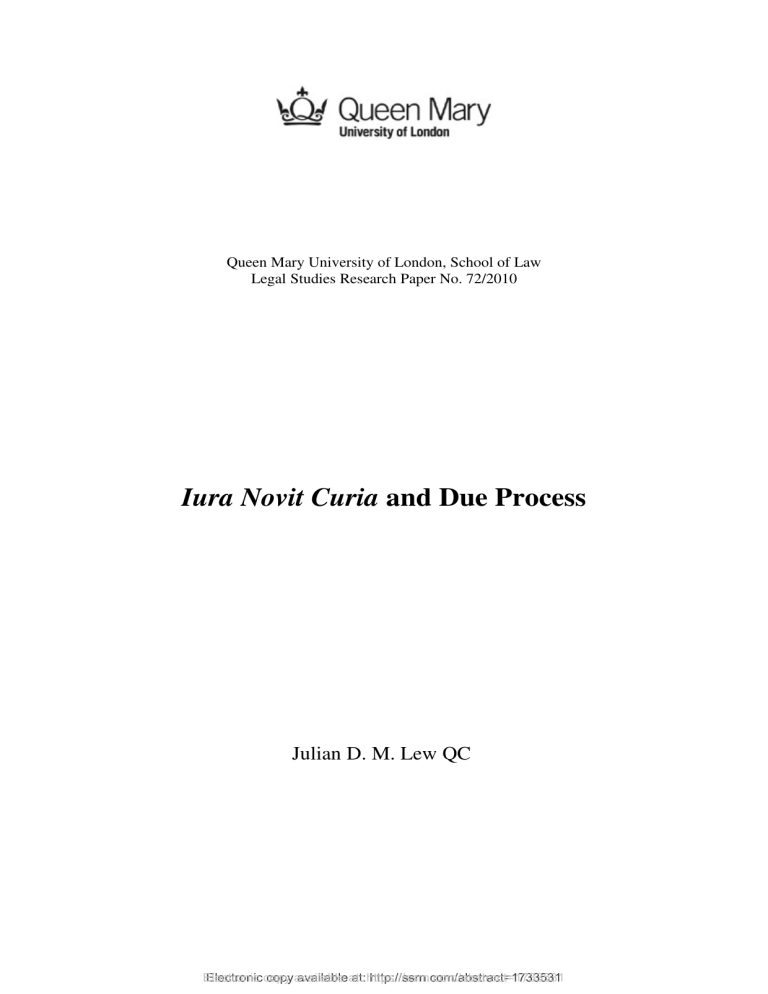
Queen Mary University of London, School of Law Legal Studies Research Paper No. 72/2010 Iura Novit Curia and Due Process Julian D. M. Lew QC Electronic Electroniccopy copyavailable availableat: at:https://ssrn.com/abstract=1733531 http://ssrn.com/abstract=1733531 Iure Novit Curia and Due Process – JDML - Final 29 x 2010 Iura Novit Curia and Due Process Julian D. M. Lew QC1 I. Introduction..............................................................................................................2 II. National law rules on proof of law ..........................................................................3 III. Determination of the content of law by arbitral tribunals........................................7 A. Applicable arbitration rules......................................................................................7 B. Agreement of the parties ..........................................................................................8 C. Applicable national law ...........................................................................................9 D. International arbitral practice.................................................................................11 IV. Importance of due process .....................................................................................12 V. Conclusion .............................................................................................................14 1 Electronic Electroniccopy copyavailable availableat: at:https://ssrn.com/abstract=1733531 http://ssrn.com/abstract=1733531 Iure Novit Curia and Due Process – JDML - Final 29 x 2010 I. Introduction 1. The 2010 survey of the School of International Arbitration on Choices in International Arbitration2 records that English and New York law applied in 40% and 17% respectively of the arbitrations in which the companies interviewed were involved.3 In 24% of arbitrations the applicable law was various different national laws. By contrast, ICC statistics record that in 2009 the most frequently chosen laws were English (14.3%), Swiss (13.1%), French (7.2%), US (7.1%), German (6%) and Brazilian (2.6%). Ninety one different laws or systems were applicable out of 817 cases.4 The number of different laws shows the importance of determining the applicable law in every case. 2. In the greatest number of cases the applicable law is chosen in the first instance by the parties and, in the absence of choice, by the tribunal. ICC statistics show that in 88% of cases parties choose the specific substantive rules to be applied.5 This means the Tribunal only needs to decide on the applicable law in 12% of ICC arbitrations.6 To determine what law governs (national or non national), many books and studies have been published,7 and methodologies have been developed conversant with the applicable choice of law provisions in national arbitration laws and under international and ad hoc arbitration rules.8 By contrast, comparatively little attention is given to the process by which the arbitrator ascertains sufficient knowledge of the content of that applicable law.9 3. This chapter is not concerned with the macro choice of law question, i.e. which national or other applicable law or rules apply. Rather it addresses the determination of the specific and detailed rules relevant to be applied to the particular issue before a tribunal, i.e. the micro choice of law. This determination generally only becomes relevant after the applicable law has been chosen or fixed.10 4. This issue is important for three reasons. First, parties want to know who should present the specific rules to the tribunal, i.e. on whom is this burden, and how should this be done. Second, the tribunal needs to know what the relevant specific rules are, and whether and how such rules are to be applied. Third, if awards are to avoid challenge for lack of due process and or excess of authority by the tribunal, the process of finding and proving the applicable rules applied by the tribunal should be known and followed by the parties and the tribunal. 5. Whilst the concerns here are the practises followed in international arbitration, the starting off points are the national legislative enactments and laws on proof of law and how they are applied by national courts. This is crucial for all disputes which come before national courts where the specific “foreign” law rules to apply in respect of an international transaction or other issue where the parties and/or subject-matter of the dispute are from or in different jurisdictions. For this purpose most national laws have rules according to which the relevant specific rules are to be determined. These are generally national procedural rules akin to private international law rules which direct the court on how to determine the choice of law issue. 6. In international arbitration, as with the absence of the forum’s conflict of law rules, there are no rules expressed as to how a tribunal should determine the content to the relevant law and the specific rules it should apply. However, the expectation is that a tribunal will correctly apply the substantive rules to issues presented by the facts in each case. The need to ascertain the content of the applicable law is an essential task of the international arbitral tribunal. 2 Electronic copy available at: https://ssrn.com/abstract=1733531 Iure Novit Curia and Due Process – JDML - Final 29 x 2010 7. International arbitration rules, institutional and ad hoc, do not address this issue. As noted, they do assist with the macro choice of law issue, containing provisions that instruct the tribunal on the hierarchy of laws to be applied,11 i.e. chosen by parties, in accordance with a conflict of laws system or rule considered appropriate, the law or rules the tribunal considers most appropriate, the contract terms (elevated to having the weight of law) and trade usages.12 However, there are no rules which guide the tribunal as to who is and how to identify the specific rules of the applicable law to be applied to the circumstances of each case. However, some rules are clear that whatever national law is applicable, the conflict of laws rules of that country are not to be applied.13 8. Unlike a national court, an international tribunal has no personal “national” law which applies except where the parties have agreed and/or the national conflict of laws rules provide that some “foreign law” is to be applied. The international tribunal also has no “national” substantive or procedural law; it equally has no foreign law to apply or consider. In an international arbitration all national laws are what they are; there is no foreign law, only another national law or non-national law.14 9. Accordingly, in considering how international tribunals can determine the specific rules or content of the applicable law, we consider briefly the following: 1. 2. 3. II. National law rules on proof of “foreign” law Determination of the content of law by arbitral tribunals Due process in the proof of law National law rules on proof of law 10. The content of law problem is frequently faced in national domestic courts when a dispute involves or requires the application of a “foreign” law. National courts have procedural rules to deal with this issue which reflect broader differences in civil law and common law court procedures and the role of the court. This can be well illustrated by the simple use of experts in courts for issues outside of the judge’s personal area of expertise or knowledge. In some civil law jurisdictions experts are always and can only be appointed by the court. In other jurisdictions experts may be appointed by the Court if the judge considers it necessary or helpful or if the parties want an expert to be appointed. In these situations the expert reports primarily to the judge and there may be circumstances where the judge may communicate with the expert on an ex parte basis, i.e. without the parties being present or even knowing that there is or was a meeting between the judge and the expert. By contrast, in many common law systems experts are selected, retained, prepared and paid for by the parties or their lawyers. The judge will ordinarily have no contact with the expert until the day of trial. In all these cases the specific rules will be found in the procedural code or rules of the court in question. 11. The use of experts in national courts, where the content of law or specific rules of foreign law are proved by an expert opinions rather than through submission or argument brought to the court, shows that determining the content of foreign law is an area of significant difference in both legal theory and court practice in different jurisdictions. In international arbitrations these differences need to be addressed, particularly where arbitrators and parties are from different legal systems. 12. The courts in most civil law jurisdictions follow the Latin maxium iura novit curia – the court knows the law.15 Of course the court does not know the law – other than its own (and even then the court does not always know it, has to decide what it is and may even get it wrong with it then being appealed to a higher court). This is equally true of many other issues of a technical, scientific, constitutional and general nature. Rather there is an assumption that “knowing the law” means that the court will research and find the 3 Electronic copy available at: https://ssrn.com/abstract=1733531 Iure Novit Curia and Due Process – JDML - Final 29 x 2010 “foreign” law. It is primarily for the court to take the necessary action to find the law in whatever way it considers appropriate. 13. Accordingly, the judge can generally apply “foreign” law by right of his authority or office (ex-officio). The courts of countries that apply this principle are not bound by the submissions or evidence of the parties or by the parties’ classification of the legal issues.16 For example, Article 16 of the Swiss Private International Law Act provides: The contents of the foreign law shall be established by the authority of its own motion. For this purpose, the cooperation of the parties may be requested. In matters involving an economic interest, the task of establishing foreign law may be assigned to the parties. 14. Similarly, Article 14 (1) of the Italian Private International Law17 provides: The judge shall ascertain the applicable foreign law ex officio. To that effect, he may use, in addition to the instruments referred to in international conventions, information obtained through the Ministry of Justice, or from experts or specialized institutions. Should the judge be unable to ascertain the foreign law to which reference is made, even with the co-operation of the parties, he shall apply the law that can be determined on the basis of other connecting factors as possibly provided for with respect to the same matter. 15. German law is even more explicit that the right of the court to find the law extends also to customary law and by-laws that may be applicable to a given situation. Article 293 of the German ZPO provides: The law which is in force in another state, customary law and by-laws require proof only to such extent as they are unknown to the court. In the establishment of these legal norms, the court is not limited to the evidence brought forward by the parties; it is empowered to make use of other sources of knowledge and to order whatever is necessary for the purposes of such utilization. 16. Accordingly, if the court does not know the law it may use any means as it thinks appropriate to determine the law which it knows. The judge may research it himself; he may seek expert advice from competent thirds parties, e.g. university or academic institutions; and/or ask the parties to bring him the law on a particular point. The basis for this approach is inherent in the function of the court to determine the matter before it whether this means determining facts, law or anything else. 17. In France, foreign law will be applied by French courts if it is invoked (and proved) by one of the parties. If the parties fail to invoke or prove foreign law, the French Court is not obliged to apply foreign law where only dispositive rights of the parties are the subject matter of the action. However, the court must apply the law ex-officio whenever the claim involves matters or rights that the parties cannot freely dispose of ("droits indisponibles") or where required by international conventions.18 Where the court is uncertain as to the law it “may invite the parties to proffer submissions on points of law which he [the judge] shall deem necessary for the resolution of the dispute.”19 18. On the other hand, many common law and some civil law systems require the parties to state the law and prove the content and how the foreign law should be applied to the court as a matter of fact and through presentation of evidence and expert opinion. This is 4 Electronic copy available at: https://ssrn.com/abstract=1733531 Iure Novit Curia and Due Process – JDML - Final 29 x 2010 because the court only knows its own law and therefore seeks to determine “foreign” law as a fact. The task of proving foreign law is borne by the parties and the judge does not need to go beyond what is presented. 19. The position in England is contained in Rule 33.7 of the Civil Procedure Rules which states: (1) This rule sets out the procedure which must be followed by a party who intends to put in evidence a finding on a question of foreign law by virtue of section 4(2) of the Civil Evidence Act 1972. (2) He must give any other party notice of his intention. (3) He must give the notice(a) if there are to be witness statements, not later than the latest date for serving them; or (b) otherwise, not less than 21 days before the hearing at which he proposes to put the finding in evidence. (4) The notice must(a) specify the question on which the finding was made; and (b) enclose a copy of a document where it is reported or recorded. 20. This is explained clearly in Rule 18 of Dicey, Morris & Collins as follows: (1) In any case to which foreign law applies, that law must be pleaded and proved as a fact to the satisfaction of the judge by expert evidence or sometimes by certain other means. (2) In the absence of satisfactory evidence of foreign law, the court will apply English law to such a case.20 21. Accordingly in the English courts foreign law must be pleaded and proved.21 The judge must rely on the parties for the material upon which he is to decide the dispute and does not have the power to go beyond this material. The judge may not seek to decide issues for himself, do his own research and seek assistance from outside the sources including academics and research centres and government. In English law the “way of knowing foreign laws is by admitting them to be proved as facts”.22 22. In contrast to the position in England, under the US Federal Rules of Civil Procedure whilst the principle remains that parties must plead foreign law as a fact, the court has and exercises great flexibility when seeking to determine the content of the foreign law. Rule 44.1 Fed. R. Civ. P provides: A party who intends to raise an issue about a foreign country's law must give notice by a pleading or other writing. In determining foreign law, the court may consider any relevant material or source, including testimony, whether or not submitted by a party or admissible under the Federal Rules of Evidence. The court's determination must be treated as a ruling on a question of law. 23. A Note of the Advisory Committee on Rule 44.1 explains that the court “may engage in its own research and consider any relevant material this found” but may insist on complete presentation from counsel. The Note goes on to state: “There is no requirement that the court give formal notice to the parties of its intention to engage in its own research on an issue of foreign law which has been raised by them, or of its intention to raise and determine independently an issue not raised by them.” However, despite this 5 Electronic copy available at: https://ssrn.com/abstract=1733531 Iure Novit Curia and Due Process – JDML - Final 29 x 2010 flexibility the Note cautions: “Ordinarily the court should inform the parties of material it has found diverging substantially from the material which they have presented.23 24. Differences in approach in the application of this rule are well illustrated by conflicting views expressed by the judges in a judgment of the 7th Circuit of the US Court of Appeals.24 Judge Posner expressed the view that a court does not have to, and should only exceptionally, rely on expert testimony regarding foreign law because: Lawyers who testify the meaning of foreign law, whether they are practitioners or professors, are paid for their testimony and selected on the basis of the convergence of their views with the litigating position of the client, or their willingness to fall in with the views urged upon them by the client. These are the banes of expert testimony. 25 25. Judge Posner added that judges should research the law themselves as there is an “abundance of published materials, in the form of treatises, law review articles, statutes, and cases … to provide neutral illumination of issues of foreign law.”26 rather than rely on paid witnesses to “spoon feed them foreign law”27. The court did not see that foreign language as a particular obstacle, as most such materials, at least in developed legal systems, are translated or translatable into the language understood by the judge. 26. In the same case Judge Wood cautioned against rejecting expert testimony on foreign law too quickly. She said: Rule 44.1 itself establishes no hierarchy for sources of foreign law, and I am unpersuaded by my colleagues’ assertion that expert testimony is categorically inferior to published English language materials. Exercises in comparative law are notoriously difficult, because the US reader is likely to miss nuisances in the foreign law, to fail to appreciate the way in which one branch of the other country’s law interacts with another, or to assume erroneously that the foreign law mirrors US law when it does not. … There will be many times when testimony from an acknowledged expert in foreign law will be helpful, or even necessary to ensure the US judge is not confronted with a “false friend” or that the US judge understands the full context of the foreign provision.28 27. Concern with foreign law experts was also expressed in a report by members of the Committee on International Commercial Dispute Resolution Association of the Bar of the City of New York. Judges referred to in that report variously said: “We have quite a few things to do besides decoding the Codigo Civil”; they “are leery of being blindsided by partisan guns for hire whom they cannot adequately check because of their own lack of familiarity with the law in question”; “I am not greatly enamoured of taking testimony from a foreign law expert, however, and think that it would be necessary only in a rare case”.29 28. A most significant factor in the exercise of a court seeking to determine and apply foreign law rules is the fallback position where it is unable to identify those rules with the requisite precision to enable it to apply those rules to resolve the issues before the court. For many judges, however foreign law is determined, there may well be discomfort and uncertainty due to their unfamiliarity with that foreign law. In such cases, the natural and inevitable fallback is to the substantive law of the court. This is recognised as the basic rule in the common law system where foreign law is generally to be proved as a fact. Although not an absolute rule Judge Roger Miner of the 2nd Circuit suggested that in a particularly difficult case the federal courts have a tendency to “duck and run” and apply the law of the forum.30 Article 16(2) of the Swiss Private International Law Act provides similarly: “Swiss law shall apply if the content of the foreign law cannot be established.” 6 Electronic copy available at: https://ssrn.com/abstract=1733531 Iure Novit Curia and Due Process – JDML - Final 29 x 2010 29. III. The description above demonstrates that different legal systems and even different individual judges within the same system take widely different approaches as to the appropriate method for acquiring and proving the content of the applicable law. In international arbitration, the problem is manifestly amplified. Determination of the content of law by arbitral tribunals 30. International arbitration tribunals do not have the formal or support infrastructure that a national court has by way of the substantive or private international law rules relating to jurisdiction, its own procedural code or rules, or its own rules for determining the content of a foreign applicable law. 31. As already noted, in international arbitration there is no “foreign” law. The tribunal has no nationality. Whatever its origins (institutional or ad hoc), whichever arbitration rules may be applied (chosen directly by the parties or by default), however the seat of the arbitration may have been fixed (by the parties or an institution), whoever the arbitrators may be (numbers or nationality, origins, experience or expertise), does not ascribe a specific nationality to the arbitral tribunal.31 Quite the contrary, it emphasises the neutral, non-national and autonomous nature of the international arbitral tribunal. Accordingly, an international arbitral tribunal needs to establish its own rules for determining the content of the applicable law, just as it does to determining procedure and conflict of laws, i.e. on an ad hoc basis according to the needs and character of each case. 32. There are four sources to which a tribunal can look to assist with this issue: 1. 2. 3. 4. 33. A. Applicable arbitration rules; Agreement of the parties; Applicable national laws; International arbitration practice. These sources can be looked at individually or together to find a suitable method. However, the method adopted will be for the particular arbitration and, as discussed below, must be made clear to the parties – after consulting with them. One important determining influence may be the lawyers representing the parties who may be reluctant to follow a method different to that with which they are familiar in their home jurisdiction and/or which they believe will work to their advantage. Applicable arbitration rules 34. Most international arbitration rules are in general terms and apply in default of the parties agreeing or the tribunal ordering something different. Few rules directly address issues of procedure, determination of law, admissibility of evidence or burden and forms of proof of the law. 35. An exception is contained in Section 22.1(c) of the LCIA Rules on Arbitration, which expressly empowers the Tribunal to conduct its own enquiries into the applicable law.32 It provides: Unless the parties at any time agree otherwise in writing, the Arbitral Tribunal shall have the power, on the application of any party or of its own motion, but in either case only after giving the parties a reasonable opportunity to state their views to conduct such enquiries as may appear to the Arbitral Tribunal to be necessary or expedient, including whether and to what extent the Arbitral Tribunal should itself take the initiative in identifying the issues and ascertaining 7 Electronic copy available at: https://ssrn.com/abstract=1733531 Iure Novit Curia and Due Process – JDML - Final 29 x 2010 the relevant facts and the law(s) or rules of law applicable to the arbitration, the merits of the parties' dispute and the Arbitration Agreement. [Emphasis added] 36. However, arbitration rules do make arbitrators the masters of their own procedure empowering them to select and fix what they consider the appropriate rules for the circumstances of the case. For example: • Article 14(2) of the LCIA Rules states: Unless otherwise agreed by the parties under Article 14.1, the Arbitral Tribunal shall have the widest discretion to discharge its duties allowed under such law(s) or rules of law as the Arbitral Tribunal may determine to be applicable: and at all times the parties shall do everything necessary for the fair, efficient and expeditious conduct of the arbitration. • Article 16.1 of the Singapore International Arbitration Centre Rules of Arbitration 2010 provides: The Tribunal shall conduct the arbitration in such manner as it considers appropriate, after consulting with the parties, to ensure the fair, expeditious, economical and final determination of the dispute. • Article 19 of the Arbitration Rules of the Arbitration Institute of the Stockholm Chamber of Commerce states: (1) Subject to these Rules and any agreement between the parties, the Arbitral Tribunal may conduct the arbitration in such manner as it considers appropriate. (2) In all cases, the Arbitral Tribunal shall conduct the arbitration in an impartial, practical and expeditious manner, giving each party an equal and reasonable opportunity to present its case. • Article 15(1) UNCITRAL Arbitration Rules provides: The arbitral tribunal may conduct the arbitration in such manner as it considers appropriate, provided that the parties are treated with equality and that at any stage of the proceedings each party is given a full opportunity of presenting his case. B. 37. Agreement of the parties It is rare that parties expressly address procedural issues in their arbitration agreement, and in particular how the tribunal is to ascertain the content of the applicable law. It may be different, but is still rare, where after a dispute arises the parties enter into a submission agreement. In such circumstances often the dispute is detailed, the arbitrators appointed and the procedure and timetable are specified in whole or in part. Here it can be that parties could agree of how the applicable legal rules are to be proved. This is also the case when arbitration has commenced and the parties pragmatically try to agree on the procedure and timetable to follow; if relevant they may address various areas of the dispute to be addressed, technical and legal, and agree how these technical and legal issues should be addressed. 33 8 Electronic copy available at: https://ssrn.com/abstract=1733531 Iure Novit Curia and Due Process – JDML - Final 29 x 2010 38. C. 39. A tribunal will generally accept and follow the procedure agreed between the parties except where for some reason it does not provide the certainty the tribunal needs. In such case the tribunal may seek to change or vary what the parties agreed to have a more practical and pragmatic approach. Absent an agreement the tribunal may look to fall back on a national legal procedure, such as that of the place of arbitration or the law governing the substantive contract, which in turn may result in unexpected outcomes for parties from different legal systems. Applicable national law Similarly most arbitration statutes are generally silent on the issue. An express exception is found in the English Arbitration Act 1996 which gives arbitrators the right to find the law themselves unless the parties agree otherwise. Section 34 provides: (1) It shall be for the tribunal to decide all procedural and evidential matters, subject to the right of the parties to agree any matter. (2) Procedural and evidential matters include ... g. whether and to what extent the tribunal should itself take the initiative in ascertaining the facts and the law. [emphasis added] 40. Less clearly, other arbitration statutes provide the arbitrator with a broad discretion over the procedural conduct of the proceeding, subject always to the agreement of the parties and ensuring the parties have the opportunity to present their case. For example: • Article 19 of the UNCITRAL Model Law provides: 1) Subject to the provisions of this Law, the parties are free to agree on the procedure to be followed by the arbitral tribunal in conducting the proceedings. (2) Failing such agreement, the arbitral tribunal may, subject to the provisions of this Law, conduct the arbitration in such manner as it considers appropriate. The power conferred upon the arbitral tribunal includes the power to determine the admissibility, relevance, materiality and weight of any evidence. • Articles 21 and 22 of the Brazilian arbitration statute34 provides: Article 21 The arbitral procedure shall comply with the procedure agreed upon by the parties in the arbitration agreement, which may refer to the rules of an arbitration institution or specialized entity, it being possible for the parties to empower the ... tribunal to regulate the procedure. First Paragraph: In the absence of any provisions on the procedure, the ... tribunal shall rule on the matter. ... Article 22 The arbitrator or the arbitral tribunal may take the parties’ deposition, hear witnesses and determine the production of expertises and other evidence deemed necessary, either ex officio or at the parties request. [Emphasis added] 9 Electronic copy available at: https://ssrn.com/abstract=1733531 Iure Novit Curia and Due Process – JDML - Final 29 x 2010 • Article 1460 of the French Civil Procedure Code provides: The arbitrators shall determine the arbitration procedure; they shall not be bound by any rules applicable in court proceedings unless the parties have provided otherwise in the arbitration agreement. [Emphasis added] • Article 25 of the Spanish Arbitration Act 200335 provides: (1) In accordance with the previous article, the parties may freely agree on the procedure to be followed by the arbitrators in the conduct of the proceedings. (2) Failing such agreement, the arbitrators may, subject to the provisions of this Act, conduct the arbitration in such manner as they consider appropriate. The power conferred upon the arbitrators includes the power to determine the admissibility, relevance, and usefulness of any evidence, the manner of taking evidence, including on the arbitrators’ own motion, and its weight. [Emphasis added] • Article 182 Swiss Private International Law Act states: (1) The parties may, directly or by reference to arbitration rules, determine the arbitral procedure; they may also submit it to a procedural law of their choice. (2) Where the parties have not determined the procedure, the arbitral shall determine it to the extent necessary, either directly or by reference to a law or to arbitration rules. (3) Whatever procedure is chosen, the arbitral tribunal shall ensure equal treatment of the parties and the right of the parties to be heard in an adversarial procedure. 41. These provisions show clearly that in the absence of agreement between the parties or a clear rule incorporated by reference to arbitration rules, an arbitral tribunal has the flexibility to fix the process it deems appropriate. However, the practices and prejudices of national systems continue to filter through and are imposed on arbitral procedures by national courts. This is well illustrated by two examples. 42. First, where an arbitration has its seat in England, absent agreement to the contrary, the English courts have held that “foreign law” should be proved. This follows the requirement in Section 46(1)(a) of the Arbitration Act that: “The arbitral tribunal shall decide the dispute in accordance with the law chosen by the parties as applicable to the substance of the dispute.” If the parties do not raise an issue about the applicability of a foreign law rule, a tribunal with its seat in England is entitled to presume that the applicable law is the same as the law of England and Wales. The court reasoned: “ ... to hold otherwise would mean that arbitrations held in London would be encumbered with the considerable extra expense of obtaining general evidence of foreign law relevant to the matters in issue in every case where the proper law of the contract was not the law of England and Wales”.36 43. The rationale for this approach is that if the parties elect not to prove the content of the applicable law, they are deemed to have impliedly chosen that the dispute be decided in accordance with English domestic law – whether or not the case is wholly domestic.37 This approach does not sit easily with the arbitrators’ duty to decide the dispute in 10 Electronic copy available at: https://ssrn.com/abstract=1733531 Iure Novit Curia and Due Process – JDML - Final 29 x 2010 accordance with the parties’ express choice of applicable law set out in the arbitration agreement or in accordance with the law otherwise found to be applicable. 44. Whatever the pragmatic merits of this approach it will be a surprise and frequently unacceptable to the party not aware or confident of the English system. The selection of arbitration is to avoid the strict national law mechanisms and procedures. In some cases the seat of arbitration is fortuitous and not chosen as a fallback to the procedure of that system.38 Even where London may have been selected expressly as a neutral and convenient seat for the arbitration it is more likely to have been relevant that the United Kingdom is party to the New York Convention, the flexibility of the Arbitration Act 1996 and the perception of London as one of the major international arbitration seats. Most seriously, if an arbitral tribunal fails to ascertain and apply the applicable rules of the law chosen by the parties this could well be grounds to refuse enforcement of an award under the New York Convention on the basis that the tribunal has acted outside the remit of the arbitration agreement.39 45. In contrast, the Swiss Federal Tribunal has held that arbitrators have an obligation to apply the law ex officio40 but may rely entirely on the arguments of the parties where proof is sufficient or may request the parties to establish the content of the applicable law.41 The effect of this decision is that even if a tribunal applies the governing law beyond or differently to the submissions of the parties, there will be no case for an annulment of the award.42 It follows that a party will not be entitled to raise an objection of lack of substantive jurisdiction. There is no violation of due process as the parties (ought to) know that in Switzerland arbitrators are deemed to know the law. However, in extreme circumstances where the parties did not mention and where they had no possibility to perceive the relevance and materiality of a point of law, the parties’ right to due process may prohibit the tribunal from basing its award on points of law not raised or considered by the parties. A key issue is that parties should not be surprised when they find the tribunal has relied on legal arguments that the parties could never have expected.43 Failure to give parties an opportunity to comment may constitute grounds for setting aside the award.44 D. International arbitral practice 46. As described above, there is no clear or definitive directive which tells arbitrators how to find the content of the applicable law. International arbitration rules are silent and national laws are not directly relevant or appropriate. The problem is manifest in the typical international arbitration where the parties and one or more of the arbitrators come from different jurisdictions and legal systems. Often the tribunal, or at least some of its members, will have little or no knowledge of the applicable substantive law. 47. In the circumstances the traditional methods to find the applicable rules to apply are rarely appropriate. Iura novit curia is wholly artificial unless at least one of the arbitrators is truly an expert in the particular applicable substantive law45 – but even then the law ought to be known and decisions made by the tribunal as a whole. Finding the law could place “excessive demands” on international arbitrators.46 Equally, the fact approach to proof of law exempts the arbitrators from finding or even understanding the relevant rules, and leaves the tribunal to follow the more persuasive expert and may leave the parties dissatisfied with the outcome. Falling back on a default law, whether of the seat or that best known the tribunal, ignores the duty of arbitrators to apply the applicable law or rules. 48. There is no hard evidence of how international tribunals fill this vacuum or the rationale with which they do so. The few cases that are known (e.g. the cases discussed at §§ 42 and 45 above) have come before a national court asked to review and or set aside or refuse enforcement of an award for a procedural or substantive irregularity. The focus of a 11 Electronic copy available at: https://ssrn.com/abstract=1733531 Iure Novit Curia and Due Process – JDML - Final 29 x 2010 national court is inevitably against the backdrop of its systems. Anecdotal evidence suggests that the processes used in national courts are followed by international tribunals but often with variations developed to meet the circumstances of the case. This includes not only the tribunal researching and finding the law itself and reliance on expert evidence, but also variations and mixing of these methods, all aimed at finding the correct rules to be applied. 49. IV. Relying on the various rules and laws discussed above (§§ 39 and 40), international tribunals frequently fix procedure and chose the applicable law by applying hybrid processes, drawn from different and several legal systems, they consider appropriate in the circumstances. The methods used at the seat of the arbitration, under the applicable substantive law, or the law governing the arbitration agreement if it differs, the origins of the tribunal members and the origins of the lawyers representing the parties, are no more than factors which can influence the method to be used by the tribunal in a given case. This is done in the context of the arbitrators’ duty to apply the law chosen by the parties. Importance of due process 50. Throughout the arbitral process the tribunal must be mindful to render an enforceable award.47 This objective is contained in many arbitration rules. For example, Article 35 of the ICC Rules requires the tribunal to “make every effort to make sure that the Award is enforceable in law”; Article 32.2 of LCIA Rules states that the tribunal “make every reasonable effort to ensure that an award is legally enforceable”.48 This is expected by the parties. 51. A fundamental requirement for enforceability of an award is adherence by the tribunal of “due process” in its widest form. Not only must parties have an opportunity to put their case and answer the issues raised by the other party and the tribunal, but also the tribunal must not exceed its authority in the terms of the arbitration agreement and decide on an issue not raised or discussed with the parties.49 Furthermore, the tribunal should endeavour to adopt methods and a procedure that minimises the risk that an award will be challenged or rendered unenforceable. 52. This necessitates three basic elements. First, the tribunal must apply the law expressly chosen by the parties, and in the absence of such choice the law which the tribunal deems applicable.50 This includes not only the system of law but the particular rules as well. Second, the parties must know the method which the tribunal is to follow in its analysis of law (or any other aspect of the case) so that they can address these issues accordingly. Arbitrators should not reach conclusions of law or fact, nor decide issues, without giving the parties an opportunity to address them. Third, the procedure being followed should be transparent: the parties should be aware of how the tribunal expects evidence and law to be presented and if the tribunal may to use its own initiatives in finding facts and law. 53. When a tribunal conducts its own research and is considering the extent to which it can apply legal rules or arguments not raised by the parties, it should be careful not to step outside of its mandate as defined by the arbitration agreement.51 Failure to apply applicable legal rules (mandatory and permissive) that were not raised by the parties may also open the way for challenge. Thus there is a risk of an award being challenged if a tribunal either does not apply the law argued by the parties, or if it applies law that was not raised by the parties. The tribunal is thus caught between Charybdis and Scylla,52 or more colloquially, between a rock and a hard place. It is therefore important wherever practicable that the tribunal obtain the parties’ agreement, or in absence of agreement give a clear direction how it intends to proceed to ascertain the content of the applicable law. As stated by Professor William Park: 12 Electronic copy available at: https://ssrn.com/abstract=1733531 Iure Novit Curia and Due Process – JDML - Final 29 x 2010 “Providing an opportunity for litigants to comment on the law remains vital both to the arbitrator getting it right and to the parties’ sense of being treated justly.”53 . 54. An example of this problem was demonstrated in the English High Court in B v A.54 A dispute arose in the context of a share purchase agreement of shares in a Spanish company. The contract was written in English but governed by Spanish law. The arbitration was under the ICC Rules and its seat was in London. Two of the arbitrators were from common law backgrounds; the other was Spanish. The award was made by majority – the two common lawyers. The dissenting (Spanish) arbitrator suggested that the majority arbitrators did not feel comfortable with Spanish law and had decided the matter in an arbitrary fashion. 55. The award was challenged on the grounds inter alia that the Tribunal failed to decide in accordance with Spanish law, the law chosen by the parties.55 The High Court dismissed the challenge on the basis that the failure to apply the chosen law contrary to section 46 of the Arbitration Act was not a serious irregularity. For the challenge to have succeeded, appellant would have had to show that the tribunal made a “conscious disregard of the provisions of the chosen law”.56 In fact the Court found the majority had based their decision on their understanding of Spanish law and that the dissenting arbitrator’s contentions that they did so erroneously was irrelevant and not grounds to challenge.57 56. By corollary, the Quebec Superior Court58 annulled an award that imposed a remedy that neither party had sought and on the basis of reasons that had neither been submitted for determination nor addressed by the parties. The case concerned a joint venture agreement which had broken down and, based on the facts pleaded, concerned the right of one party to invoke the buy-out arrangements due to the other party’s breaches. The Tribunal found the relationship between the parties to have broken down completely and ordered the dissolution of the joint venture invoking the valuation and buyout provisions in the joint venture agreement. The Court set aside the Award on the grounds that “the Valuation and Buyout Remedy was improperly fashioned according to the Tribunal’s own perception as to what was fair and equitable, rather than by respecting the scope of the mandate consented and agreed to by the parties” and more particularly “(i) violated the audi alteram partem rule; (ii) dealt with a dispute which was not contemplated by the parties and decided matters beyond the scope of the Terms of Reference”.59 57. Although there would appear to be differences as to the extent that some national courts would uphold an award on a legal point not argued by or discussed with the parties,60 it is generally advisable that tribunals should not decide issues without the prior debate with the parties. Rather, arbitrators should ask parties to address purely legal issues which were not discussed during the proceedings and which the parties could not have been aware the tribunal might consider applying. As suggested by Poudret & Besson “arbitrators should rather show more caution (rather than be more audacious) than the courts before substituting their legal arguments for those of the parties”.61 This approach was adopted by the sole arbitrator in an ICSID case in 2005 where he stated: In respect of international arbitration taking place in Sweden, it is sometimes suggested that the principle iura novit curia applies, but the parties should be notified of new legal sources introduced by the arbitrator, so that they have the possibility to comment on them.62 58. This has been upheld by the courts in England63 and France64. By contrast, in Switzerland arbitrators have an ex officio obligation but should not surprise the parties by applying a legal rule which they could not have foreseen.65 In Sweden and Finland a similar approach is taken.66 German courts have also taken an expansive view on the iura novit curia 13 Electronic copy available at: https://ssrn.com/abstract=1733531 Iure Novit Curia and Due Process – JDML - Final 29 x 2010 doctrine by arbitral tribunals. In a case where an arbitrator had been independently assisted by a legal advisor with his deliberations, the Bundesgerichthof held that the “arbitrators had heard the parties on their legal views; it was not necessary to hear the parties on the legal view of the jurists.”67 59. On a practical level, to avoid misunderstandings between parties and arbitrators from different cultures, legal systems and jurisdictions, the expectations of the parties and the intentions of the tribunal should be openly discussed and circumscribed at an early stage. This could be done in the arbitration agreement (as discussed above this is not an issue parties would normally consider at the time the contract is negotiated), or in a procedural order of the tribunal dealing with the presentation of law and other issues. Professor Kaufmann-Kohler68 pragmatically suggests wording in the following terms: The parties shall establish the content of the law applicable to the merits. The arbitral tribunal shall have the power, but not the obligation, to conduct its own research to establish such content. If it makes use of such power, the tribunal shall give the parties an opportunity to comment on the results of the tribunal’s research. If the content of the applicable law is not established with respect to a specific issue, the arbitral tribunal is empowered to apply to such issue any rule of law it deems appropriate. V. Conclusion 60. There is no “uniform, homogeneous practice”69 with regard to proof of law. Whilst there are national rules for determining the content of “foreign” law in national courts, they are neither homogeneous nor complimentary. Even within civil law and common law systems, their application differs. Accordingly, an international tribunal has the freedom and flexibility to select a method to determine the applicable rules to reach the correct decision in each case. In all such situations, the tribunal must follow a method that is reasonable, objective, fair and transparent. 61. This means that, except in rare cases and absent agreement by the parties, no one system should be preferred. Much will depend on the circumstances of the case, the legal issues in dispute and the composition of the tribunal. The method followed by the tribunal can be developed specifically, and may be a variation or hybrid of the “know the law” and expert approaches. 62. If experts are relied on, the questions referred to them and the documentation they are asked to review, should be uniform. The tribunal could consider either having its own expert in addition to those of the parties – though this will have additional cost implications. Alternatively, the tribunal could suggest just one expert be appointed and instructed by the tribunal but with input from both parties. The expert then could be examined or challenged by both parties and the tribunal. This could lead to a more objective opinion and reduce cost but does reduce the control of the parties. Another practical option, frequently followed by tribunals, is to examine the experts jointly (conferencing), or even in the form of a “teach in” by the experts of the tribunal. Where appropriate the tribunal should be taken to original sources, e.g., legislative texts, regulations, by-laws and court decisions, to understand how these rules should be applied. 63. Where parties are to argue the law, again it should be done by bringing the relevant sources to the attention of the tribunal. There is an imbalance where one party argues the law and the other relies on expert evidence. Arguing the law will often involve oral presentations before the tribunal. In this respect, a tribunal will be expected to know and understand the law even if this includes doing its own research as to the content of the law 14 Electronic copy available at: https://ssrn.com/abstract=1733531 Iure Novit Curia and Due Process – JDML - Final 29 x 2010 – and to reach its conclusions on the basis of the knowledge acquired and on its understanding of what it finds to be the relevant rules. 64. Hybrid processes may include submissions of law by the parties, expert reports and the tribunal doing its own research. This may be overkill, complicate the issues and increase the costs. However, the key is to bring the relevant legal rules to the tribunal and for the application of those rules to be understood by the tribunal. If the tribunal is not satisfied with the law as presented by the parties, it could instruct an expert to assist with its understanding. Any instructions to an expert should be open and transparent so the parties are aware of what has been requested and what is advised. 65. However a tribunal decides to deal with this issue, due process requires that the parties are aware of the method to be followed. There should be no surprises and no arguments that a party was denied the opportunity to present or defend its case. This is an issue that, where possible, tribunals should discuss with the parties at an early stage, and could also be included in a procedural order or direction given to the parties. 66. There is an emerging international consensus amongst commentators that a hybrid approach to proof of content of law issues is preferable in international arbitration. At first instance, in most cases, the parties should establish the content of the applicable law. International arbitrators do not always “know the law”. Where uncertain as to the applicable rules, or if it considers that an important legal issue arises relevant to the outcome of the case and/or which the parties have not (or not adequately) addressed, the tribunal may do its own research, or ask questions and seek clarifications from the parties. 67. A tribunal is free to undertake its own research on points of law not argued by the parties, or beyond the scope of the parties submissions. However, it should do so openly and provide the parties with the opportunity to comment on any matter that may materially affect the tribunal’s decision. This approach supports the principle that each party be allowed to present its case, minimises the tribunal’s risk of error and reduces risk of challenge to the award. It also allows the tribunal to “rely on arguments which strike them as the best ones, even if those arguments were not developed by the parties (although they could have been)”.70 68. The use of a hybrid method to prove the applicable rules of law accords with the transnational nature of international arbitration. It allows the parties and the tribunal to accommodate differences between the backgrounds and expectations of the parties and the tribunal members, and ensures that the parties are clear about the procedure followed by the arbitral tribunal. Ultimately, if it goes off on a “frolic” of its own,71 the tribunal risks stepping outside its mandate and the award being challenged. That outcome is neither helpful nor desirable. 1 2 3 4 5 6 Barrister, 20 Essex Street, London; Professor and Head, School of International Arbitration, Centre for Commercial Law Studies, Queen Mary, University of London Available at www.arbitrationonline.org, last visited 28 October 2010 Ibid, p 11. Other specified laws are Swiss and French, respectively 8% and 6% ICC Bulletin, Volume 21 (1) 2010, at p 12 Ibid Of course even where there is a chosen governing law it will often be necessary for arbitrators to determine issues that may be subject to another law, e.g.. capacity of a party, validity of a peripheral contract, an agency or distribution agreement under another regime and issues of mandatory law 15 Electronic copy available at: https://ssrn.com/abstract=1733531 Iure Novit Curia and Due Process – JDML - Final 29 x 2010 7 8 9 10 11 12 13 See for example: Lew, Julian D.M., Applicable Law in International Commercial Arbitration: A Study in Commercial Arbitration Awards, Oceana Sijthoff, (1978); Grigera Naón, Choice of Law Problems in International Commercial Arbitration (1992); Hanotiau, What Law Governs the Issue of Arbitrability?, 12 Arb. Int’l 391 (1996); Lew, Julian D.M, The Law Applicable to the Form and Substance of the Arbitration Clause in Albert Jan van den Berg (ed), Improving the Efficiency of Arbitration and Awards: 40 Years of Application of the New York Convention, ICCA Congress Series, 1998 Paris Volume 9 (Kluwer Law International 1999) pp. 114 – 145; Blessing, Choice of Substantive Law in International Arbitration,14(2) J. Int’l Arb. 39 (1997); Grigera Naón, Choice-of-Law Problems in International Commercial Arbitration, 289 Recueil des Cours 9 (2001); Giuditta Cordero Moss. "International Arbitration and the Quest for the Applicable Law" Global Jurist 8.3 (2008) See for example: Germany ZPO § 1051(2) “Failing any designation by the parties, the arbitral tribunal shall apply the law of the State with which the subject matter of the State is most closely connected” Article 187(1) of the Swiss Private International Law Act provides, “The arbitral tribunal shall decide the dispute according to the rules of law chosen by the parties or, in the absence of such a choice, according to the rules of law with which the action is most closely connected”; UNCITRAL Model Law, Article 28(2) “Failing any designation by the parties, the arbitral tribunal shall apply the law determined by the conflict of laws rules which it considers applicable”; New Zealand Arbitration Act, First Schedule, 28(2), “the arbitral tribunal shall apply the law determined by the conflict of laws rules which it deems applicable”; England Arbitration Act 1996 § 46(3) that: “if or to the extent that there is no … choice or agreement… the tribunal shall apply the law determined by the conflict of laws rules which it considers applicable.” Article 1496 of the French New Code of Civil Procedure provides that the arbitral tribunal may resolve the dispute “in accordance with the rules of law it considers appropriate.”; UNCITRAL Rules Article 33(1) “the arbitral tribunal shall apply the law determined by the conflict of laws rules which it considers applicable.”; Article 17(1) of the ICC Rules “The parties shall be free to agree upon the rules of law to be applied by the Arbitral Tribunal to the merits of the dispute. In the absence of any such agreement, the Arbitral Tribunal shall apply the rules of law which it determines to be appropriate; Similarly see LCIA Arbitration Rules 22(3); WIPO Arbitration Rules 59(a); Stockholm Arbitration Institute Rules Article 22(1) As discussed below, a few exceptions are found in the English Arbitration Act, Articles 34(1) and 34(2)(g); See also Danish Arbitration Act 27(2); Dutch Code of Civil Procedure Article 1044 and LCIA Arbitration Rules; Article 22.1(c) Ten years ago I wrote an article, “Proof of Applicable Law in International Commercial Arbitration”, in Festschrift für Otto Sandrock (2000) p 581, where I intended to provoke discussion of this relatively neglected topic. Over the past ten years there have been several valuable contributions to this topic including: Filip De Ly, Mark Friedman and Luca Radicati Di Brozolo for the International Law Association International Commercial Arbitration Committee’s Report and Recommendations on “Ascertaining the Contents of the Applicable Law in International Arbitration” in 26(2) Arbitration International 191-220 (2010); Gabrielle KaufmannKohler, The Arbitrator and the Law: Does He/She know it? And a few more questions, 21 Arbitration International 631-638 (2005); Gabrielle Kaufmann-Kohler, The Governing Law: Fact or Law? – A Transnational Rule on Establishing its Contents, Best Practices in International Arbitration, ASA Special Series No 26 (July 2006), p 79-85; Kurkela, M, “Jura novit curia” and the Burden of Education in International Arbitration – a Nordic Perspective’ (2003) ASA Bulletin 486-500; Prof. Dr. Rainer Hausmann, Pleading and Proof of Foreign Law – a Comparative Analysis”, The European Legal Forum, Issue 1-2008, I-1-I13; Laurent Levy, “Jura Novit Curia? The Arbitrator’s discretion in the application of the governing law; http://kluwerarbitrationblog.com/blog/2009/03/20/jura-novit-curia-the-arbitrator%E2%80%99sdiscretion-in-the-application-of-the-governing-law/, last visited 29 September 2010; William W Park. “Arbitrators and Accuracy” in Journal of International Dispute Settlement, Volume 1, No 1, February 2010, 25-53 ICC Arbitration Rules, § 17; WIPO Arbitration Rules, § 59; Stockholm Arbitration Institute, § 22; Singapore International Arbitration Centre, § 27; UNCITRAL Arbitration Rules, § 33. See for example, ICC Rules, § 17(2); UNCITRAL Rules, § 33(3); WIPO Rules, § 59(a). This is the argument that the rights and obligations of the parties should be applied directly. The applicable law is only relevant if the contract terms are silent or ambiguous or contrary to some mandatory law that cannot be excluded or countermanded WIPO Rules, § 59(a); Stockholm Arbitration Institute, § 22(2) 16 Electronic copy available at: https://ssrn.com/abstract=1733531 Iure Novit Curia and Due Process – JDML - Final 29 x 2010 14 15 16 17 18 19 20 21 22 23 24 25 26 27 28 29 30 31 32 33 34 35 36 37 38 39 40 41 42 43 44 45 46 47 For example, international commercial law, general principles of law, lex mercatoria, Sha’aria law, Jewish law For example, under German procedural law foreign law is treated as law and not as fact. See Prof. Dr. Rainer Hausmann, Pleading and Proof of Foreign Law – a Comparative Analysis”, The European Legal Forum, Issue 1-2008, I-1-I13, available at http://www.simonslaw.com/library/pdf/e/878.pdf, last visited 8 October 2010 For example, see Kurkela, M, “Jura novit curia” and the Burden of Education in International Arbitration – a Nordic Perspective’ (2003) ASA Bulletin 486 for a discussion of the position in Sweden and Finland Law Reforming the Italian system of Private International Law of 31 May 1995 Hausmann, op cit fn 10, at page I-5 Article 13 French New Code de Procedure Civil Dicey, Morris & Collins, The Conflict of Laws, Sweet & Maxwell, 2006, 14th edition, § 9-001. See also Adrian Briggs, Agreements on Jurisdiction and Choice of Law, Oxford, 2008, § 2.212.29 Ascherberg, Hopwood and Crew Limited v Casa Musicale Sonzogno [1971] 1 WLR 1128 (CA); [1971] 3 All ER 38; Global Multimedia International Ltd v Ara Media Services [2006] EWHC 3612, § 38 Mostyn v Fabrigas (1774), 1 Cowper’s King’s Bench Reports (Cowp.) 161, 174 (Lord Mansfield). 1966 Advisory Committee Notes, US Federal Rules of Civil Procedure, Rule 44.1 Bodum USA Inc v La Cafetiere Inc, United States Court of Appeals, 7th Circuit, 2 September 2010, 2010 U.S. App. LEXIS 18374, page 17 Ibid, page 21 Ibid, , page 21 Ibid, , page 23 Ibid, Wood J, page 38 “Proof of foreign law after Four Decades with Rule 44.1 FRCP and CPLR 4511 http://www.abcny.org/pdf/report/International_Commercial_Dispute.pdf, see pages 4, 6 and 8. Committee on International Commercial Dispute Resolution Association of the Bar of the City of New York, op cit, page 5 For a contradictory view as to national jurisdiction control see, Rau, Alan Scott, Understanding (and Misunderstanding) 'Primary Jurisdiction', available at, http://papers.ssrn.com/sol3/papers.cfm?abstract_id=1633555, last visited 21 October 2010, page 17 This is not the normal position taken by English Courts. See §§ 18-21 above See suggestion of Professor Kaufmann-Kohler at § 59 Law No 9.307 of 23 September 1996 Ley 60/2003 de 23 de diciembre, de arbitraje Hussman (Europe) Ltd v Al Ameen Dev & Trade Co [2000] EWHC 210 (Comm), § 42 Dicey, Morris & Collins, § 9-002 Born, G, International Commercial Arbitration, Kluwer Law International, 2009, p 1678, fn 18 See § 53 ; New York Convention, Article V(1)(b) and V(1)(c); also Filip De Ly, Mark Friedman and Luca Radicati Di Brozolo, op cit fn 10, in 26 Arbitration International 193 (2010), at p 213 See Swiss Federal Tribunal, 30 September 2003, 4P.100/2003, 22 ASA Bulletin (2004) No. 22, p. 574 and 579 Swiss Federal Tribunal, D Doo v Bank C, 27 April 2005, (2005) ASA Bulletin 719 See by comparison Swiss Federal Tribunal, 9 February 2009, 4A_400/2008. The Federal Tribunal quashed a Court of Arbitration for Sport award on the basis that the arbitrators had referred to provision of law that could not have been contemplated and was not relied on by the parties. The Tribunal also failed to give the parties an opportunity to comment on the applicability of the provision. See Laurent Levy, op cit fn 10 Laurent Levy, op cit This view is echoed in, William W Park, op cit fn 10, at page 44 Lauren Levy, ibid See Gabrielle Kaufmann-Kohler, op. cit., fn 10, at p 631, and 637, where she stated “counsel would be ill-advised to submit an opinion of Swiss law to a Swiss contract law professor in which one of his colleagues purports to teach him contract interpretation.” Klaus Peter Berger, Private dispute resolution in international business: Negotiation, Mediation, Arbitration, Volume II, Handbook, Kluwer Law International, 2009, 476-477 Queen Mary University London / Pricewaterhouse Coopers, “International Arbitration: Corporate Attitudes and Practices 2006”, p 6, “enforceability of awards was ranked as the single most 17 Electronic copy available at: https://ssrn.com/abstract=1733531 Iure Novit Curia and Due Process – JDML - Final 29 x 2010 48 49 50 51 52 53 54 55 56 57 58 59 60 61 62 63 64 65 66 67 68 69 70 71 important advantage [of international arbitration] by the highest number of respondents.” http://www.arbitrationonline.org/docs/IAstudy_2006.pdf, last visited 28 September 2010 See also, Article 47 Arbitration Rules of the Arbitration Institute of the Stockholm Chamber of Commerce: “In all matters not expressly provided for in these Rules, the SCC, the Arbitral Tribunal and the parties shall act in the spirit of these Rules and shall make every reasonable effort to ensure that all awards are legally enforceable.” Artice 62(e) WIPO Rules: “The Tribunal may consult the Center with regard to matters of form, particularly to ensure the enforceability of the award” New York Convention Article V(1)(b) and V(1)(c) This is well recognised by almost all the choice of law provisions in the institutional and other international arbitration rules, and many national laws, see e.g. UNCITRAL Model Law Article 28 and § 187 Swiss Private International Law Act Filip De Ly, Mark Friedman and Luca Radicati Di Brozolo, op cit fn 10, at p 213. See also New York Convention Article V(1)(c); UNCITRAL Model Law 34(2)(iii) and (iv); Section 68(2)(b) and (c) English Arbitration Act 1996 See Kalnina, Ieva, “Iura Novit Curia: Scylla and Charybdis of International Arbitration?”, in 8 Baltic Yearbook of Int’l Law 2008. In Greek mythology these were two sea monsters that guarded opposite sides of the narrow passage through which Odysseus had to sail in his wanderings. Scylla had six snaky heads and reached out to seize and devour six of Odysseus' companions. Charybdis, was the personification of a whirlpool, who drank down and belched forth the waters three times a day. The shipwrecked Odysseus saved himself by clinging to a tree on the shore until his raft floated to the surface. See http://www.britannica.com/ re Scylla and Charybdis William W Park,op cit fn 10, at p 44 B v A, [2010] EWHC 1862. See note of Nicholas Fletcher to ITA Board of Reporters, Kluwer Law International, http://www.kluwerarbitration.com/document.aspx?id=KLI-KA-1033006. Under sections 67 (procedural irregularity) and 68 (excess of jurisdiction) of the English Arbitration Act 1996 Op cit, at § 25 The Court also held that an error of law was not held to involve an excess of power under S.68(2) of the English Arbitration Act Louis Dreyfus S.A.S. v Holding Tusculum B.V. 2008 QCCS 5903, available at http://www.mcgill.ca/arbitration/othercases/ Ibid at §§ 74 - 75 See discussion in J.F Poudret & S Besson, Comparative Law of International Commercial Arbitration (2nd Edition), Sweet & Maxwell, 2007, §§ 551-552 and §§ 801-803 Ibid § 551, p 476 Iurii Bogdanove, Agurdino-Invest Ltd and Agurdino-Chima JSC v Republic of Moldova, SCC, Arbitral Award, 22 September 2005, § 2.2.1 Modern Engineering v Miskin [1981] 1 Lloyd’s Rep. 135 (CA) Rev. arb. 1995, p 448 Rev. arb 1995, p 597; Cora v Casion, Les Cahiers de l’Arbitrage No. 2004/2/1 Switzerland see Swiss Federal Tribunal Decision of 30 September 2003, 4P.100/2003 22 ASA Bulletin (2004) No 22, p 574; Kurkela, “Jura novit curia” and the Burden of Education in International Arbitration – a Nordic perspective, ASA Bul. 2003, 486-500, 499-500 Franz T Schwarz, and Christian W Konrad, , The Vienna Rules: A Commentary on International Arbitration in Austria, § 20-044 - § 20-046; See BGH, 22 May 1957, V ZR 236/56, ZZP 71 (1958) 427 Gabrielle Kaufmann-Kohler, The Governing Law, op. cit. fn 10 , at p 6; See also KaufmannKohler, The Arbitrator and the Law, op. cit. fn 10, at p 635 Ibid, p 634. Klockner v Cameroon, Decision on annulment, 3 May 1985, 2 ICSID Reports 95, § 91 Louis Dreyfus S.A.S v Holding Tuscullum B.V., op. cit. fn 58, at § 102 18 Electronic copy available at: https://ssrn.com/abstract=1733531
